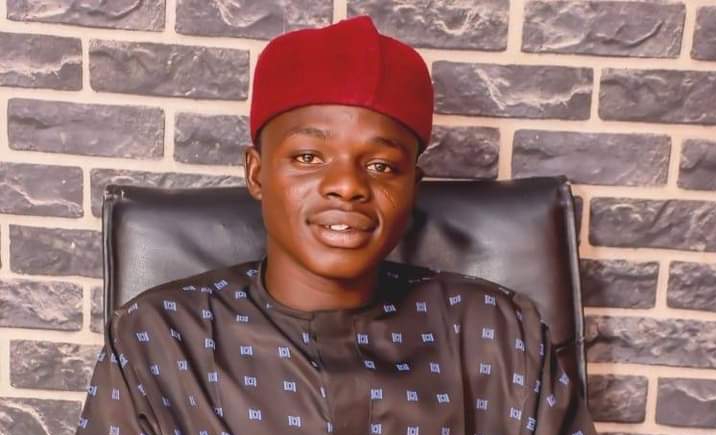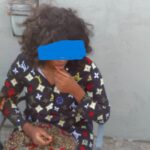One night in 2010, Umar Saleh Burra was awake, and he began complaining about a fever.
His mother gave him herbal medicine, but his fever persisted the following day. The family took him to the hospital, where doctors diagnosed him with meningitis and began treatment.
Saleh spent nearly a month in the hospital, unaware that he had lost his hearing. He only noticed that he was looking at people’s mouths when they spoke, but he didn’t know what was happening to him or what deafness was.
One day, one of Saleh’s siblings visited the hospital and said something to him, but Saleh didn’t respond. His mother grew worried and asked the doctors to test Saleh’s hearing. The results confirmed that he was deaf.
“It didn’t bother me much, but I could see that my family were worried. My mother was always crying. I was then discharged from the hospital, and some neighbours encouraged my mother to take me to Abubakar Tafawa Balewa University Teaching Hospital in Bauchi, where I underwent different tests plus speech training,” Saleh said.
Following his ear surgery at Abubakar Tafawa Balewa University Teaching Hospital in Bauchi, Saleh regained the ability to speak using his mouth, and people could understand him. However, he remained unable to hear their responses.
Bouncing back
At the time of this incident, Saleh was on the verge of taking his primary five exams at Budugu Primary School, located in the Burra District of Ningi Local Government Area in Nigeria’s Bauchi State, his hometown.
Despite his hospital discharge, Saleh was determined to return to school and continue his studies alongside his classmates.
“My teacher was a very nice man and tried as much as possible to speak slowly while I lip-read him, but it was a difficult task once he moved around the classroom, ensuring that the students were following. I felt so lonely and empty. During break time, I often sat alone because it was hard to mingle with my classmates. I depended mostly on textbooks and any notes given out by the teacher to assist my learning,” Saleh narrated.
After graduating from primary school, he was enrolled at the Government Junior Secondary School Burra, where he continued to depend on lip reading.
During that time, lip reading, which he developed as a skill, helped him to cope with school activities, and he was still sad that he had yet to meet someone who had a similar condition to him. He wasn’t also familiar with sign language interpretation then.
Learning sign language in school
Saleh still remembers his introduction to sign language. At the same time, a student at the Aminu Saleh College of Education in Azare in 2019, Saleh one day noticed a group of people in the community with their hands. “I was so frightened that I hurriedly asked my friend about them. The fear was evident in my eyes as he explained they were also deaf, like me. I retorted, ‘I’m not deaf like them,'” Saleh confessed.
Back then, Saleh was in denial about his deafness, staunchly resisting the idea of learning sign language.
“I felt ashamed of sign language, and learning it was out of the question. I consistently communicated with my teachers verbally, but with my classmates, I resorted to gestures or writing on paper. I was lucky that some of my coursemates can communicate like that,” he added.
Over time, Saleh began to learn sign language while not wanting other people to know about it. Subsequently, during lectures, he realised how interesting sign language could be.
“I then learned it fast, and it helped me blend into the deaf culture easily. I’m now proud to practice it everywhere I find myself. Honestly, after losing my hearing, I was ashamed of telling people that I’m deaf, but today, I’m proud to let the world know that I’m one. Sign language is my major communication channel,” Saleh told Prime Progress.
Taking a path in journalism
While he was still at the Aminu Saleh College of Education, Azare, Saleh befriended another deaf person who had experience in journalism.
“I have been interested in journalism since secondary school,” Saleh recounted.
The person taught Saleh the ethics of journalism and guided him on how to report stories.
Also, his participation in an online training organised by Inclusive News Network, a disability-focused newspaper across Nigeria, has allowed Saleh to become a disability reporter in Bauchi State for the platform.
Today, he is also an Editor with the Katagum Dailypost, a local newspaper in Bauchi State.
Saleh admitted that he hasn’t faced discrimination or challenges in his community due to his hearing impairment.
“People have shown me love and care that I have never expected because of my condition. So, I learned that they have to understand hearing loss is not a curse but a destiny. It can happen to anyone at any time,” said the 25-year-old.
Saleh also said that being deaf doesn’t mean the end of the world. He believed that everyone is unique and advised that people who have similar conditions to him should love themselves and have high self-esteem.
He continued: “Don’t allow society to make you feel less important. Do what you are good at doing with a sense of pride. Don’t look down on yourself because of your deafness; work hard and be self-dependent to become a better citizen by contributing your quota towards the development of your community.”
However, Saleh is committed to his dreams of becoming a professional disability journalist, expanding his farm, and growing as a teacher for the deaf community.
“Through achieving my dreams, I hope to inspire more enrolment of deaf people in schools,” he concluded.
In 2010, Umar Saleh Burra was diagnosed with meningitis, which resulted in his loss of hearing. Unaware of his deafness initially, it was confirmed during his hospital stay. Despite this setback, Saleh returned to school, depending on lip reading and written notes to keep up with his studies. He struggled with loneliness and isolation but was determined to continue his education.
While attending the Aminu Saleh College of Education in 2019, Saleh discovered sign language, though initially resistant to learning it due to denial about his condition. Over time, he embraced sign language, which helped him integrate into the deaf community. Saleh eventually became proficient and proud of his new communication method.
With a growing interest in journalism, Saleh received mentorship from a fellow deaf individual and participated in an online journalism training. He now works as a disability reporter and editor at local newspapers in Bauchi State, earning respect and support from his community. Saleh advocates for self-love and confidence among those with similar conditions and encourages them to contribute positively to their communities.
He is committed to his aspirations of being a professional disability journalist, expanding his farm, and teaching within the deaf community, hoping to inspire more deaf individuals to pursue education.






